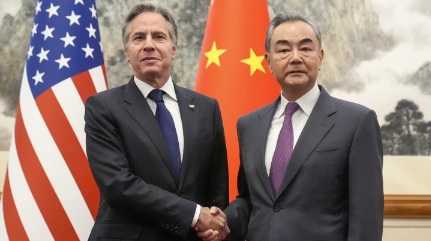
BEIJING (AP) — U.S. Secretary of State Antony Blinken met Friday with Chinese President Xi Jinping and senior Chinese officials, stressing the importance of “responsibly managing” the differences between the United States and China as the two sides butted heads over a number of contentious bilateral, regional and global issues.
Talks between the two sides have increased in recent months, even as differences have grown. Blinken said he raised concerns with Xi about China’s support for Russia and its invasion of Ukraine, as well as other issues including Taiwan and the South China Sea, human rights and the production and export of synthetic opioid precursors.
Blinken sounded a positive note on recent progress made in bilateral cooperation, including in military communications, counternarcotics and artificial intelligence.
“We are committed to maintaining and strengthening lines of communication to advance that agenda, and again deal responsibly with our differences so we avoid any miscommunications, any misperceptions, any miscalculations,” he said.
But he said he made clear to Xi ongoing concerns about Beijing’s supply of materials, including machine tools and micro electronics, to Moscow that President Vladimir Putin is using to boost Russia’s defenses and its war on Ukraine.
“Russia would struggle to sustain its assault on Ukraine without China’s support,” Blinken told reporters after his meeting with Xi.
“Fueling Russia’s defense industrial base not only threatens Ukrainian security, it threatens European security,” he added. “As we’ve told China for some time, ensuring transatlantic security is a core U.S. interest. In our discussions today. I made clear that China does not address this problem.”
Blinken also said he urged China to use its influence “to discourage Iran and its proxies from expanding the conflict in the Middle East ” and convince North Korea “to end its dangerous behavior and engage in dialogue.”
Blinken also discussed with Xi China’s maritime maneuvers in the disputed South China Sea, and reiterated “ironclad” American support for the Philippines, its oldest treaty ally in Asia.
Xi stressed that China and the U.S. must seek common ground “rather than engage in vicious competition.”
“China is happy to see a confident, open, prosperous and thriving United States,” the Chinese leader said. “We hope the U.S. can also look at China’s development in a positive light. This is a fundamental issue that must be addressed.”
Earlier, Blinken held lengthy talks with Chinese Foreign Minister Wang Yi and Public Security Minister Wang Xiaohong.
He and Wang underscored the importance of keeping lines of communication open as they lamented persistent and deepening divisions that threaten global security. Those divisions were highlighted earlier this week when U.S. President Joe Biden signed a massive foreign aid bill that contains several elements that the Chinese see as problematic.
“Overall, the China-U.S. relationship is beginning to stabilize,” Wang told Blinken at the start of about 5 1/2 hours of talks. “But at the same time, the negative factors in the relationship are still increasing and building and the relationship is facing all kinds of disruptions.”
“Should China and the United States keep to the right direction of moving forward with stability or return to a downward spiral?” he asked. “This is a major question before our two countries and tests our sincerity and ability.”
Wang also outlined, without being specific, well-known Chinese complaints about U.S. policies and positions on the South China Sea, Taiwan, human rights and China’s right to conduct relations with countries it deems fit.
“China’s legitimate development rights have been unreasonably suppressed and our core interests are facing challenges,” he said. “China’s concerns are consistent. We have always called for respect of each other’s core interests and urge the United States not to interfere in China’s internal affairs, not to hold China’s development back, and not to step on China’s red lines on China’s sovereignty, security, and development interests.”
Blinken responded by saying that the Biden administration places a premium on U.S.-China dialogue even on issues of dispute. He noted there had been some progress in the past year but suggested that talks would continue to be difficult.
The State Department said later that Blinken and Wang had “in-depth, substantive, and constructive discussions about areas of difference as well as areas of cooperation” and made clear that Blinken had stood his ground on U.S. concerns.
Blinken “emphasized that the U.S. will continue to stand up for our interests and values and those of our allies and partners, including on human rights and economic issues,” State Department spokesperson Matthew Miller said in a statement.
Blinken arrived in China on Wednesday, visiting Shanghai shortly before Biden signed the $95 billion foreign aid package that has several elements likely to anger Beijing, including $8 billion to counter China’s growing aggressiveness toward Taiwan and in the South China Sea. It also seeks to force TikTok’s China-based parent company to sell the social media platform.
China and the United States are the major players in the Indo-Pacific. Washington has become increasingly alarmed by Beijing’s growing aggressiveness in recent years toward Taiwan and its smaller Southeast Asian neighbors with which it has significant territorial and maritime disputes in the South China Sea.
China has railed against U.S. assistance to Taiwan and immediately condemned the aid as a dangerous provocation. It also strongly opposes efforts to force TikTok’s sale.
The bill also allots $61 billion for Ukraine to defend itself from Russia’s invasion. The Biden administration has complained loudly that Chinese support for Russia’s military-industrial sector has allowed Moscow to subvert western sanctions and ramp up attacks on Ukraine.
U.S. officials have said China’s ties with Russia would be a primary topic of conversation during Blinken’s visit, and just before Friday’s meetings began, Russian President Vladimir Putin announced he would visit China in May.




